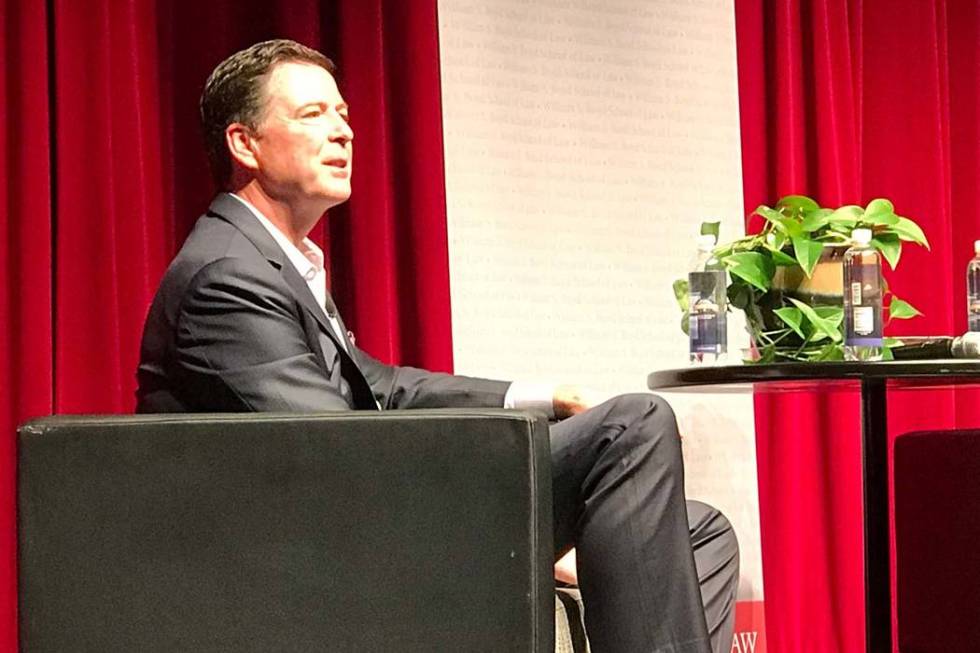Ex-FBI Director James Comey recalls controversial call

Former FBI Director James Comey started his presentation on leadership at UNLV on Monday by saying leaders need to be, among other things, humble.
At the end of his talk, he discussed in humble terms one of the most consequential decisions of his career: a decision to notify Congress just before the 2016 election that the bureau had reopened an investigation into Hillary Clinton’s emails.
“If I was certain I was right, I’d be a moron,” Comey said. “I’m not certain that I was right. But I respect people who see it differently.”
He added, “I’m still not certain it was the right decision.”
Millions of Comey’s critics are certain that he was wrong and that he cost Clinton the 2016 election.
The discovery of hundreds of thousands of Clinton emails on the laptop computer of Anthony Weiner, husband of top Clinton aide Huma Abedin, presented Comey with what he called a clash of norms. On one hand, Justice Department tradition said officials shouldn’t do anything that might interfere in an election. On the other hand was the obligation to be honest with Congress, and Comey had already told lawmakers the investigation was over.
If he spoke up, he could throw the election to Donald Trump. If he said nothing and later found evidence that Clinton had intentionally broken laws governing the handling of classified information, he’d be accused of a coverup.
“I regret that the FBI was involved. And I regret the pain that’s caused the institution. And it will linger,” Comey said. “That said, I think the pain would be worse if I did the other thing.”
One thing Comey said he is sure of: He made the decision without respect to politics, based on the law and the values of the FBI.
That was another piece of leadership advice Comey gave to the students, judges and others who attended the Boyd Law School’s second Law and Leadership event Tuesday. Ethical leadership, he told the audience, involves looking up from the day-to-day events and crises that bedevil organizations to focus on core values.
Comey encouraged leaders to consider how their decisions will be viewed at the remove of history and said the final call is not as important as how you make it.
“Lawyers are uniquely suited to be ethical leaders,” he said. “You’re being forced to lift yourself above the storm.”
And he’s seen plenty of storms. Comey told event moderator and former Gov. Brian Sandoval about his days prosecuting mob cases in New York, fighting street-level crime in Richmond, Virginia, and investigating terrorism.
Comey detailed the now-infamous story of rushing to George Washington University Hospital to prevent two top White House officials from forcing an ill Attorney General John Ashcroft to reauthorize a legally dubious electronic surveillance program. And he detailed efforts by President Donald Trump to extract a pledge of loyalty, although the FBI is supposed to be an independent agency.
Comey didn’t comment on reports that Trump had allegedly withheld foreign aid from Ukraine while asking that country’s leader to investigate the son of former Vice President Joe Biden for corruption. But he did say that up until now, his preference was for voters to decide Trump’s fate rather than members of Congress in an impeachment.
“Because I thought that would let us off the hook,” he said. “We need a moment of inflection in this country. We need the American people to stand up, go to the polls and say what kind of values we expect our leaders to reflect, who are we as a country, and (removal by impeachment) would deprive us of that and let us off the hook. We should not be let off the hook.”
Contact Steve Sebelius at SSebelius@reviewjournal.com or 702-383-0253. Follow @SteveSebelius on Twitter.